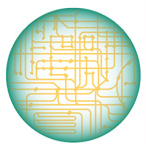AI/ML for Bioenergy Research in CABBI
Authors:
Huimin Zhao1* (zhao5@illinois.edu), Yasuo Yoshikuni2, Jonathan Sweedler1, Andy VanLoocke3, Matt Hudson1, and Andrew Leakey1
Institutions:
1University of Illinois–Urbana-Champaign; 2Lawrence Berkeley National Laboratory; and 3Iowa State University
URLs:
Goals
Center for Advanced Bioenergy and Bioproducts Innovation (CABBI) aims to develop and apply a wide variety of artificial intelligence (AI)/machine learning (ML) tools for bioenergy research ranging from plant growth to biosystems design to process development to sustainability study.
Abstract
Thanks to recent advances in genomics, data science, and automation, there is a growing trend in developing and applying AI/ML tools for bioenergy research. In the past few years, CABBI has made much progress in this emerging research area and is now poised to take the lead in developing it into a mature field. In this poster, researchers will highlight a few representative AI/ML projects in CABBI. These examples include: (1) leveraging AI/ML to predict end-of-season yield and phenotype for sorghum and miscanthus from an aerial imagery time series (Leakey lab), (2) designing gRNA for CRISPR-based genetic engineering of plants (Hudson lab), (3) developing a self-driving biofoundry for biosystem design (Zhao/Sweedler labs), (4) enabling single nucleotide polymorphisms genotyping of Issatchenkia orientalis by AI/ML (Yoshikuni lab), and (5) using AI/ML and satellite data to predict miscanthus yields in research plots and commercial fields (VanLoocke lab).
References
HamediRad, M., et al. 2019. “Towards a Fully Automated Algorithm-Driven Platform for Biosystems Design,” Nature Communications 10, 5150.
Paul, H. M., et al. 2022. “CROPSR: An Automated Platform for Complex Genome-Wide CRISPR gRNA Design and Validation,” BMC Bioinformatics 23, 74.
Petersen, B., et al. 2021, December 13–17. Using Cross-Scale Data to Constrain an Agro-Ecosystem Model to Produce Estimates of Miscanthus Production at a Field-Scale. American Geophysical Union (AGU) Fall Meeting 2021, New Orleans, LA.
Varela, S., et al. 2022. “Deep Convolutional Neural Networks Exploit High-Spatial- and -Temporal-Resolution Aerial Imagery to Phenotype Key Traits in Miscanthus,” Remote Sensing 14(21), 5333.
Yoshikuni, Y., et al. “SNP Genotyping.” In preparation.
Yu, T., et al. “In Vitro Continuous Protein Evolution Empowered by Machine Learning and Automation.” Cell Systems. Accepted.
Funding Information
This research was supported by the DOE Office of Science, Biological and Environmental Research (BER) Program, grant no. DE-SC0018420.
